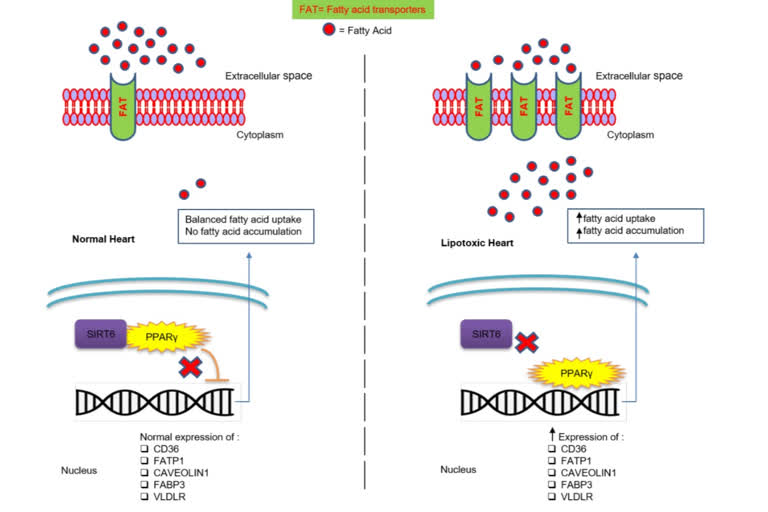Bengaluru: A new insight researched in the IISc Department of Microbiology and Cell Biology (MCB) states that Activating SIRT6 protein and increasing its expression might be beneficial to treat severe cardiac diseases.
According to Associate Professor N Ravi Sundaresan, fatty acids are formed when the fat in our diet breaks down during digestion. While many of the body’s organs use glucose as their primary energy source, the heart derives most of its required energy (over 70%) from the oxidation of fatty acids. These are crucial for sustaining cardiomyocytes – cardiac muscle cells that control the rhythmic beating of the heart. However, the accumulation of excess fatty acids in cardiomyocytes triggers harmful responses, often leading to severe cardiac diseases.
A recent study published in Cell Reports by a team of researchers from India and the US, led by scientists at the Indian Institute of Science (IISc), provides important insights into how fatty acid uptake is regulated in cardiomyocytes. “We identified a mechanism by which fatty acid transport (to cardiomyocytes) is critically regulated by a protein called SIRT6,” says team lead Ravi Sundaresan. The study shows that SIRT6 could be a potential therapeutic target for treating several metabolic diseases affecting the heart.
Also Read: Research begins on Anandaiah's ayurvedic cure for Covid
Speaking to ETV Bharat he said there are several ways to increase or activate the functioning of SIRT6. As of now, the trials have been done on mice and it takes at least 5 to 10 years to pass clinical trials, he added. Cardiomyocytes have several fatty acid transporters – specific proteins enhancing the uptake of fatty acids from the blood into the cells – to ensure sufficient supply. The authors say that this is the first study to show that SIRT6 regulates the genes responsible for the formation of these transporter proteins in cardiomyocytes.
The team observed that cardiomyocytes devoid of the SIRT6 protein had higher levels of fatty acid transporters, resulting in higher uptake and accumulation of fatty acids. They also showed that increasing the level of SIRT6 in cardiomyocytes lowered the levels of these transporters, thereby reducing fatty acid uptake and accumulation. The researchers carried out most of the studies in experimental mice models.
Sundaresan previously led another study that showed that SIRT6 can regulate protein synthesis without functioning as an enzyme. “Fatty acids are very useful for the heart if properly utilised,” Sundaresan explains. However, the accumulation of more fatty acids than the heart can utilise in cardiomyocytes causes lipotoxicity – a condition in which accumulation of lipids can eventually have grave consequences such as inflammation and cell death.
Notably, diabetes and obesity are among certain pathological conditions in which levels of fatty acid transporters are reportedly higher. Under such conditions, activating SIRT6 and increasing its expression might be a beneficial therapeutic intervention, the researchers suggest. The team also included Narayanaswamy Srinivasan, Professor in the Molecular Biophysics Unit, IISc, researchers from the Tata Institute of Fundamental Research, India, and Harvard Medical School, USA.
Also Read: ARCI develops cost-effective catalysts for metal-air battery



